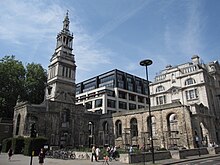Christchurch, Newgate Street
| Christ Church Greyfriars | |
|---|---|

Christ Church Greyfriars, seen from the southeast
|
|
| Country | United Kingdom |
| Denomination | Roman Catholic, Anglican |
| Architecture | |
| Heritage designation | Grade I |
Christ Church Greyfriars, also known as Christ Church Newgate Street, was a church in Newgate Street, opposite St Paul's Cathedral in the City of London. Established as a monastic church in the thirteenth century, it became a parish church after the dissolution of the monastery. Following its destruction in the Great Fire of London of 1666, it was rebuilt to the designs of Sir Christopher Wren. Except for the tower, the church was largely destroyed by bombing during the Second World War. The ruins are now a public garden.
Christ Church Greyfriars had its origins in the conventual church of a Franciscan monastery, the name "Greyfriars" being a reference to the grey habits worn by Franciscan monks. The first church on the site was built in the thirteenth century, but this was soon replaced by a bigger building, begun in 1306 and consecrated in 1326 This new church was the second largest in medieval London, measuring 300 feet (91 m) long and 89 feet (27 m) wide, with at least eleven altars. It was built partly at the expense of Marguerite of France, second wife of King Edward I. She was buried at the church, as was Isabella, widow of Edward II. The heart of Eleanor of Provence, wife of Henry III, was also interred there.
Richard Whittington, Lord Mayor of London founded a library in connection with the church in 1429.
The monastery was dissolved in 1538 during the English Reformation. The building and fittings suffered heavy damage in this period. Tombs disappeared, sold for their marble and other valuable materials; monuments were defaced. In 1546 Henry VIII gave the priory and its church, along with the churches of St Nicholas Shambles and St Ewin, Newgate Market, to the City Corporation. A new parish of Christ Church was created, incorporating those of St Nicholas and St Ewin, and part of that of St Sepulchre,. The priory buildings later housed Christ's Hospital school, founded by Edward VI, and the church became its pupils' principal place of worship. In 1640s Christ Church was the church of the Presbyterian polemicist Thomas Edwards, and during May 1647 became a centre of operations for attempts to disband and pay arrears to members of the New Model Army.
...
Wikipedia
